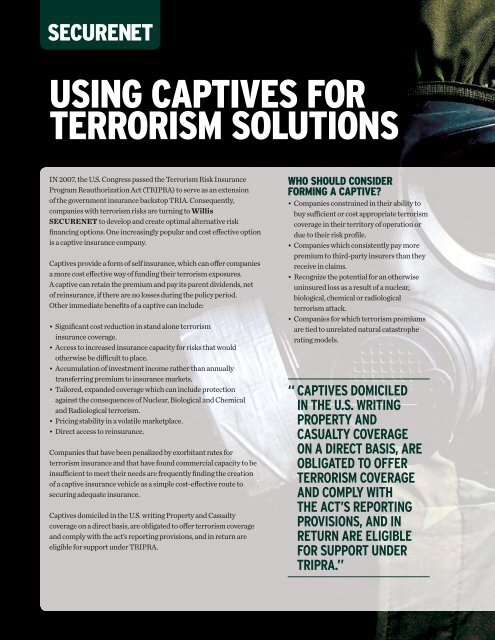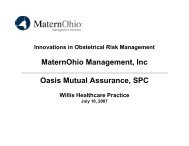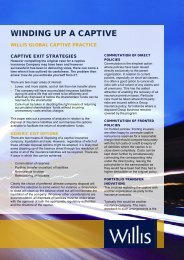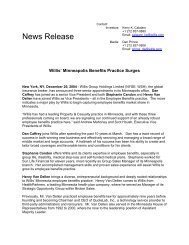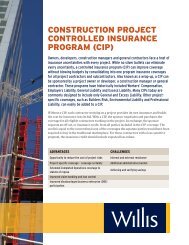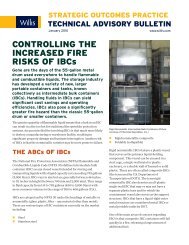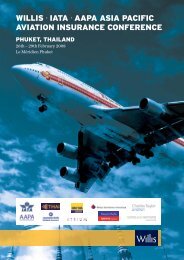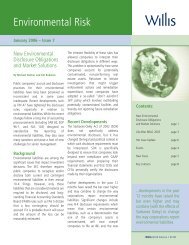USING CAPTIVES FOR TERRORISM SOLUTIONS - Willis
USING CAPTIVES FOR TERRORISM SOLUTIONS - Willis
USING CAPTIVES FOR TERRORISM SOLUTIONS - Willis
Create successful ePaper yourself
Turn your PDF publications into a flip-book with our unique Google optimized e-Paper software.
SECURENET<br />
<strong>USING</strong> <strong>CAPTIVES</strong> <strong>FOR</strong><br />
<strong>TERRORISM</strong> <strong>SOLUTIONS</strong><br />
IN 2007, the U.S. Congress passed the Terrorism Risk Insurance<br />
Program Reauthorization Act (TRIPRA) to serve as an extension<br />
of the government insurance backstop TRIA. Consequently,<br />
companies with terrorism risks are turning to <strong>Willis</strong><br />
SECURENET to develop and create optimal alternative risk<br />
fi nancing options. One increasingly popular and cost eff ective option<br />
is a captive insurance company.<br />
Captives provide a form of self insurance, which can off er companies<br />
a more cost eff ective way of funding their terrorism exposures.<br />
A captive can retain the premium and pay its parent dividends, net<br />
of reinsurance, if there are no losses during the policy period.<br />
Other immediate benefi ts of a captive can include:<br />
• Signifi cant cost reduction in stand alone terrorism<br />
insurance coverage.<br />
• Access to increased insurance capacity for risks that would<br />
otherwise be diffi cult to place.<br />
• Accumulation of investment income rather than annually<br />
transferring premium to insurance markets.<br />
• Tailored, expanded coverage which can include protection<br />
against the consequences of Nuclear, Biological and Chemical<br />
and Radiological terrorism.<br />
• Pricing stability in a volatile marketplace.<br />
• Direct access to reinsurance.<br />
Companies that have been penalized by exorbitant rates for<br />
terrorism insurance and that have found commercial capacity to be<br />
insuffi cient to meet their needs are frequently fi nding the creation<br />
of a captive insurance vehicle as a simple cost-eff ective route to<br />
securing adequate insurance.<br />
Captives domiciled in the U.S. writing Property and Casualty<br />
coverage on a direct basis, are obligated to off er terrorism coverage<br />
and comply with the act’s reporting provisions, and in return are<br />
eligible for support under TRIPRA.<br />
WHO SHOULD CONSIDER<br />
<strong>FOR</strong>MING A CAPTIVE?<br />
• Companies constrained in their ability to<br />
buy suffi cient or cost appropriate terrorism<br />
coverage in their territory of operation or<br />
due to their risk profi le.<br />
• Companies which consistently pay more<br />
premium to third-party insurers than they<br />
receive in claims.<br />
• Recognize the potential for an otherwise<br />
uninsured loss as a result of a nuclear,<br />
biological, chemical or radiological<br />
terrorism attack.<br />
• Companies for which terrorism premiums<br />
are tied to unrelated natural catastrophe<br />
rating models.<br />
“ Captives domiCiled<br />
in the U.s. writing<br />
property and<br />
CasUalty Coverage<br />
on a direCt basis, are<br />
obligated to offer<br />
terrorism Coverage<br />
and Comply with<br />
the aCt’s reporting<br />
provisions, and in<br />
retUrn are eligible<br />
for sUpport Under<br />
tripra.”<br />
8852_Captives _insert_US letter.indd 1 19/04/2011 19:17:52
HOW <strong>TERRORISM</strong> COVERAGE<br />
WORKS IN <strong>CAPTIVES</strong><br />
Captives domiciled in the U.S. providing Property and Casualty<br />
coverage on a direct basis, are eligible for support under the provisions<br />
of TRIPRA. They are obligated to offer terrorism coverage and comply<br />
with the act’s reporting provisions. Currently, domestic captives<br />
are direct writing certified terrorism coverage most commonly for<br />
Property exposures, however, TRIPRA support is available for losses<br />
resulting from any terrorism event that complies with the definition<br />
under the Act and when certified by the Secretary of Treasury.<br />
For certified acts of terrorism, insurers providing TRIPRA coverage<br />
would be subject to a deductible equivalent to a percentage of their<br />
annual direct earned premiums (20%) and would subsequently be<br />
eligible for an 85% quota share reinsurance reimbursement from<br />
the federal government for certified terrorism losses in excess of the<br />
deductible. Utilizing a captive to provide terrorism coverage under<br />
TRIA offers several advantages over a commercial insurance carrier,<br />
in addition to the typical advantages of a captive program.<br />
For example, coverage can be extended to cover:<br />
• Certified losses resulting from nuclear, biological, chemical<br />
and radiological perils—typically excluded in most commercial<br />
terrorism policies.<br />
• Unlimited contingent time element coverage.<br />
• losses as a result of cyber terrorism.<br />
• Confiscation, denial of access, or public order to demolish<br />
a building after an act of terrorism.<br />
• Time element coverage as a result of a port or airport closure.<br />
Additionally, captives are not required to pay funds to their<br />
policyholders in advance of receiving reimbursement from the<br />
federal government, alleviating cash flow issues.<br />
STRUCTURING THE CAPTIVE<br />
For TRIPRA to operate there has to be losses to a certain level which<br />
are deemed to be due to a Certified Act of Terrorism<br />
losses must be in excess of a $5M threshold and then all certified<br />
insured losses in a year must exceed an “across industry” national<br />
aggregate of $100M.<br />
“ Captives domiCiled in the U.s.<br />
providing property and CasUalty<br />
Coverage on a direCt basis, are<br />
eligible for sUpport Under the<br />
provisions of tripra.”<br />
TRIPRA cover details are:<br />
• First dollar cover in excess of deductible<br />
of 20% of premium.<br />
• 85% of program limit.<br />
• ‘Premium’: 133% recovery assessment.<br />
• Total coverage limit: $100 BN.<br />
• Follows form – coverage and limits.<br />
Reinsurance for those risk exposures<br />
not backstopped by TRIPRA is<br />
normally available; including the<br />
15% retained quota share, the 20% of<br />
premium TRIPRA deductible and the<br />
$100M “TRIPRA trigger”. Coverage<br />
can also extend to provide for a delay<br />
in the certification and/or payment<br />
process which extends more than 180<br />
days. The <strong>Willis</strong> SECURENET Team<br />
is a leader in structuring seamless<br />
and highly competitive reinsurance<br />
programs which protect the captive’s<br />
balance sheet.<br />
8852_Captives _insert_US letter.indd 2 19/04/2011 19:17:53
On the whole, entities accessing TRIPRA directly through their captive<br />
subsidiaries have broader coverage, and in the event of no loss may<br />
recoup premiums. TRIPRA coverage does however have its limitations:<br />
• In the event of losses being paid by TRIPRA, TRIPRA will assess all<br />
insurers (regardless of whether or not they made a claim) covering<br />
Terrorism insurance, an assessment which recoups 133%<br />
of TRIPRA’s loss aggregate payout.<br />
• There is a $100 Billion coverage cap to TRIPRA in any one<br />
annual year.<br />
The Department of the Treasury has cautioned that captives must be<br />
adequately capitalized, charge a market based premium and should not<br />
be constructed in such a way as to be deemed as “gaming” the program.<br />
Statutory capitalization requirements and start up costs vary by<br />
domicile and lines of coverage written.<br />
WHY EMPLOY A CAPTIVE OVER A COMMERCIAL<br />
INSURANCE CARRIER?<br />
In addition to the typical advantages of a captive program, employing<br />
a captive to provide terrorism coverage under TRIPRA offers several<br />
advantages over a commercial insurance carrier.<br />
For example, coverage can be extended to:<br />
• Properties perceived as high risk or in highly aggregated zones.<br />
• Certified losses resulting from nuclear, biological, chemical and<br />
radiological perils that are typically excluded in most commercial<br />
terrorism policies.<br />
• Unlimited contingent time element coverage.<br />
• losses as a result of cyber terrorism.<br />
• Confiscation, denial of access, or public order to demolish a building<br />
after an act.<br />
• Time element coverage as a result of a port or airport closure.<br />
Additionally, captives are not required to pay funds to their<br />
policyholders in advance of receiving reimbursement from the federal<br />
government, alleviating cash flow issues.<br />
Working as one team, <strong>Willis</strong> SECURENET and the <strong>Willis</strong><br />
Captive Practice are market leaders in the development of<br />
captives to fully utilize the benefits available under TRIPRA.<br />
As necessary, we will assist at every stage of captive formation and<br />
management, which includes but is not limited to:<br />
• Feasibility analysis.<br />
• Domicile selection.<br />
• Determination of estimated start-up costs and operating expenses.<br />
• Exploration of marketplace options for reinsurance.<br />
• Development of underwriting parameters and policy issuance.<br />
• Maintaining communications with state insurance departments<br />
for regulatory and filing matters.<br />
• Preparation of stewardship and broker research reports.<br />
• Claims administration and reporting.<br />
“ on the whole,<br />
entities aCCessing<br />
tripra direCtly<br />
throUgh their<br />
Captive sUbsidiaries<br />
have broader<br />
Coverage, and in the<br />
event of no loss may<br />
reCoUp premiUms.”<br />
8852_Captives _insert_US letter.indd 3 19/04/2011 19:18:00
<strong>Willis</strong> Limited<br />
The <strong>Willis</strong> Building<br />
51 lime Street<br />
london, EC3M 7DQ<br />
United Kingdom<br />
Tel: +44 (0)20 3124 6000<br />
Fax: +44 (0)20 3124 8223<br />
www.willis.com<br />
Please contact the<br />
<strong>Willis</strong> SECURENET team<br />
for additional information at<br />
securenet@willis.com<br />
or contact:<br />
Wendy Peters<br />
Tel: (1) 610-254-7288<br />
Email: wendy.peters@willis.com<br />
This publication offers a general overview of its subject matter. It does not necessarily address every aspect of its subject or every product available in the market. It is not<br />
intended to be, and should not be, used to replace specific advice relating to individual situations and we do not offer, and this should not be seen as, legal, accounting or tax<br />
advice. If you intend to take any action or make any decision on the basis of the content of this publication you should first seek specific advice from an appropriate professional.<br />
Some of the information in this publication may be compiled from third party sources we consider to be reliable, however we do not guarantee and are not responsible for the<br />
accuracy of such. The views expressed are not necessarily those of the <strong>Willis</strong> Group. Copyright <strong>Willis</strong> limited 2011. All rights reserved.<br />
<strong>Willis</strong> limited, Registered number: 181116 England and Wales.<br />
Registered address: 51 lime Street, london, EC3M 7DQ.<br />
A lloyd’s Broker. Authorised and regulated by the Financial Services Authority.<br />
8852/04/11<br />
8852_Captives _insert_US letter.indd 4 19/04/2011 19:18:00


